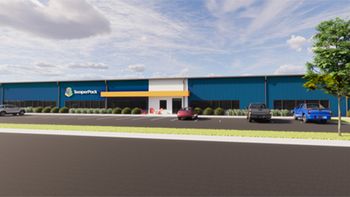
Cold chain vendor looks to a global presence in 2017
Added locations—as well as new product offerings—from Pelican Biothermal
Come January, Pelican Biothermal (Plymouth, MN) will begin making deliveries of its Credo Cargo, a passive, pallet-scale shipping container previewed at
In light of these trends, Kevin Lawler, VP Sales at Pelican, took a moment to speak with Pharmaceutical Commerce on these and other trends affecting the temperature-controlled logistics market. “Like the pharma industry itself, this field is seeing consolidation through mergers and acquisitions,” he says, noting the recent acquisitions by FedEx of
This, in turn, puts a spotlight on Pelican’s network of service centers by which it manages resuable container systems. The company has been offering a reuse service for its high-performance containers through service centers in the US and the UK (the latter opened in early 2016); now, it has (or is about to) open centers in Singapore, Tokyo, on the European continent and in Puerto Rico. The service is managed through an asset-management system branded as ProEnvision. “In the right circumstances, a reuse program can provide a lower total cost of ownership (TCO) than single-use technologies, and we’re finding more customers interested in that option,” he says.
Another trend affecting Pelican’s product mix is the growth of cellular therapy—still a small part of overall biopharma shipping, but one that is expected to ramp up in coming years. Some of these therapies require frozen (-20°C) or “deep frozen” (-50°C, or colder) shipping, and usually for containers of a few liters’ payload. Pelican addresses this market with its Credo Cube product line, adding in lower-temperature phase-change materials (PCMs) to maintain the lower temperatures. Coming from the opposite end of the temperature spectrum, however, is the increased interest in packaging for controlled room-temperature (CRT) packaging, especially in Europe where the EU-originated Good Distribution Practice (GDP) standards are now widely adopted. For that market, Lawler says, Pelican’s Credo (reusable) or Chronos (single-use) product lines are being specified. Both lines feature a modular design that allows for either CRT or refrigerated temperature control with essentially the same bill of materials.
To match the global needs of both manufacturers and logistics companies, Pelican has spent a good part of the past year arranging partnerships with local providers. The list includes Enviropac in Singapore, PharmaServ in the Philippines, CMC Element in China, BioThermal Solutions in Chile, Kroytec in Mexico and NatBio in Brazil.
Newsletter
Stay ahead in the life sciences industry with Pharmaceutical Commerce, the latest news, trends, and strategies in drug distribution, commercialization, and market access.




